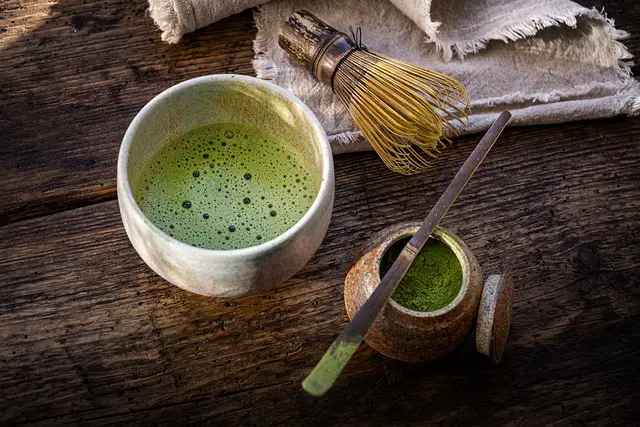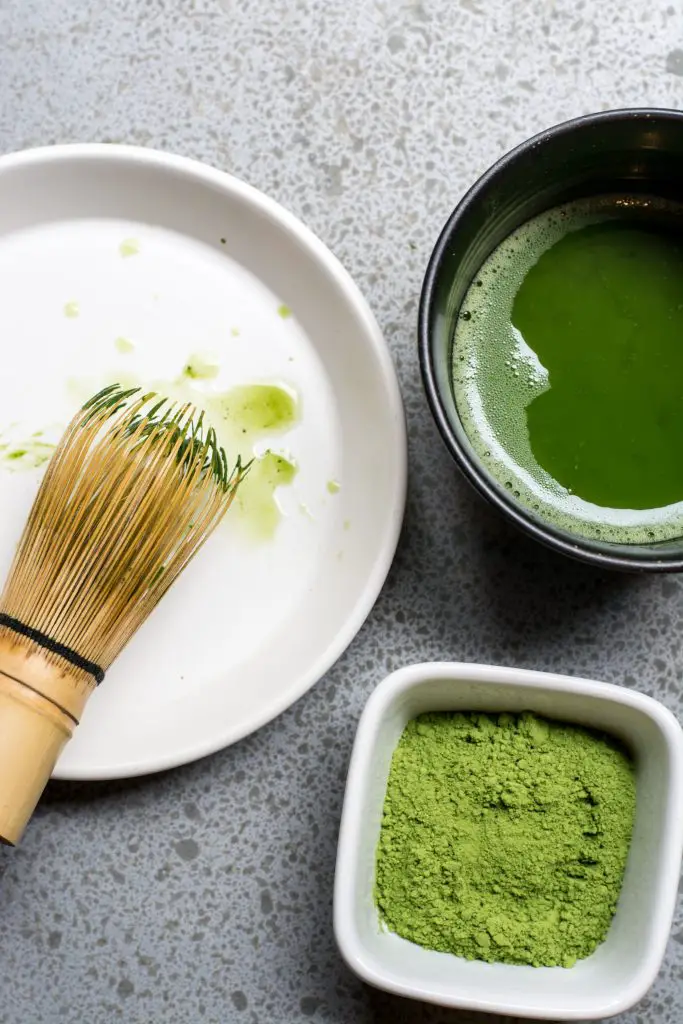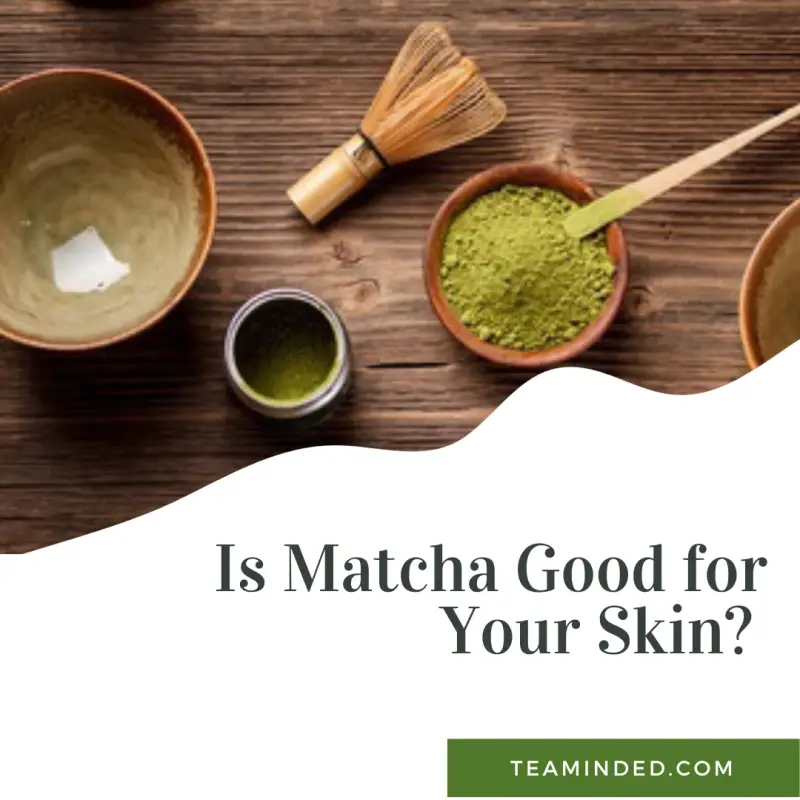Matcha has become increasingly popular in recent years, not just as a beverage but also as a skincare ingredient. Many people claim that matcha can help improve the health and appearance of your skin, but is there any truth to these claims?
In this article, we’ll explore the potential benefits of matcha for your skin and whether or not it’s worth incorporating into your skincare routine.

Matcha is a type of green tea that is made from finely ground, shade-grown tea leaves. Unlike traditional green tea, which is steeped in hot water and then discarded, matcha is consumed in its entirety, including the tea leaves. This means that you’re getting a much higher concentration of nutrients and antioxidants with each cup of matcha. But what exactly are these nutrients, and how do they benefit your skin?
Quick Navigation
Key Takeaways
- Matcha is a type of green tea that is consumed in its entirety, including the tea leaves.
- Matcha is rich in antioxidants and other nutrients that may benefit your skin.
- While there is limited scientific research on the skincare benefits of matcha, many people claim that it can help improve the health and appearance of their skin.
What is Matcha?
Matcha is a type of green tea that originated in Japan. It is made from shade-grown tea leaves that are ground into a fine powder. The unique growing and processing methods of matcha give it a distinct flavor and nutrient profile compared to other types of green tea.
Matcha green tea is rich in antioxidants, specifically catechins, which have been shown to have anti-inflammatory and anti-cancer properties. It also contains L-theanine, an amino acid that promotes relaxation and reduces stress.
Matcha has become increasingly popular in recent years due to its potential health benefits and versatility in cooking and baking. It can be enjoyed as a traditional tea, added to smoothies or lattes, or used as a flavoring in desserts and snacks.
In the realm of skincare, matcha is celebrated for its possible anti-aging properties and ability to enhance skin radiance. The antioxidants present in matcha could offer protection against skin damage from free radicals, and its caffeine component may assist in diminishing puffiness and under-eye shadows. Nonetheless, further studies are essential to comprehensively grasp matcha’s impact on skin health.
Nutritional Components of Matcha
Matcha contains a variety of vitamins, minerals, and antioxidants that are beneficial for your skin.
Here are some of the nutritional components of matcha:
- Catechins: Matcha is rich in catechins, which are a type of antioxidant. Catechins help to protect the skin from damage caused by free radicals, which can lead to premature aging and skin cancer.
- EGCG: Matcha contains a specific type of catechin called EGCG (epigallocatechin gallate). EGCG is known for its anti-inflammatory properties, which can help to reduce redness and inflammation in the skin.
- Vitamin C: Matcha is a good source of vitamin C, which is essential for the production of collagen. Collagen is a protein that is found in the skin and helps to keep it firm and elastic.
- Vitamin E: Matcha also contains vitamin E, which is a powerful antioxidant. Vitamin E helps to protect the skin from damage caused by UV radiation and other environmental stressors.
- Chlorophyll: Matcha is rich in chlorophyll, which gives it its vibrant green color. Chlorophyll has been shown to help detoxify the skin and reduce the appearance of dark circles and blemishes.
Matcha stands out as a nutrient-rich superfood that offers various advantages for your skin. Integrating matcha into your daily diet could aid in safeguarding your skin from harm, maintaining its health, and enhancing its natural glow.
Skin Benefits of Matcha
In recent years, matcha has gained popularity as a skincare ingredient due to its high antioxidant content and anti-inflammatory properties.
Antioxidant Properties
Matcha is rich in antioxidants, which are compounds that protect the skin from damage caused by free radicals. Free radicals are unstable molecules that can damage cells and contribute to the aging process. Antioxidants neutralize free radicals, preventing them from causing harm to the skin.
One of the main antioxidants found in matcha is epigallocatechin gallate (EGCG), which has been shown to have anti-aging effects on the skin. EGCG can help reduce inflammation, improve skin elasticity, and protect against UV damage.
Anti-Inflammatory Effects
Inflammation is a natural response to injury or infection, but chronic inflammation can damage the skin and lead to premature aging. Matcha has anti-inflammatory properties that can help reduce redness, swelling, and irritation in the skin.
In addition to EGCG, matcha also contains other anti-inflammatory compounds, such as catechins and flavonoids. These compounds can help soothe the skin and improve its overall appearance.
Skin Detoxification

from the skin
Matcha is also known for its detoxifying properties, which can help remove toxins from the skin and improve its overall health. The chlorophyll in matcha helps to eliminate toxins and pollutants from the skin, while also promoting cell regeneration.
In addition, matcha contains caffeine, which can help stimulate blood flow and improve circulation in the skin. This can help reduce puffiness and dark circles under the eyes, as well as improve the overall tone and texture of the skin.
Overall, matcha is a beneficial ingredient for improving the health and appearance of the skin. Its antioxidant, anti-inflammatory, and detoxifying properties make it a great addition to any skincare routine.
How to Use Matcha for Skin Care
Matcha is a versatile ingredient that can be used in a variety of ways to improve your skin’s health. Here are two popular ways to use matcha for skin care:
Matcha Face Masks
Matcha face masks are a great way to nourish your skin and give it a healthy glow. Here’s a simple recipe to make your own matcha face mask at home:
- Mix 1 teaspoon of matcha powder with 1 tablespoon of honey and 1 tablespoon of plain yogurt.
- Apply the mixture to your face and leave it on for 15-20 minutes.
- Rinse off with warm water and pat dry.
This face mask is great for all skin types and can be used once a week for best results.
Matcha Skin Care Products
If you’re not into DIY, there are plenty of matcha skin care products on the market that you can try. Look for products that contain high-quality matcha powder and other natural ingredients.
Some popular matcha skin care products include:
- Matcha Green Tea Antioxidant Face Cream
- Matcha Green Tea Detoxifying Clay Mask
- Matcha Green Tea Cleansing Foam
Using matcha skin care products can help reduce inflammation, improve skin elasticity, and protect your skin from environmental stressors.
Incorporating matcha into your skin care routine can help improve your skin’s health and appearance. Whether you prefer DIY face masks or store-bought products, there’s a matcha option for everyone.
Potential Side Effects of Matcha on Skin
While matcha is generally considered safe to use on your skin, there are a few potential side effects to be aware of.
1. Allergic Reactions
Some people may be allergic to matcha, which can cause skin irritation, redness, and itching. If you experience any of these symptoms after using matcha on your skin, stop using it immediately and consult a doctor.
2. Sensitivity to Caffeine
Matcha contains caffeine, which can cause sensitivity in some people. If you are sensitive to caffeine, you may experience skin irritation, redness, and itching after using matcha on your skin.
3. Staining
Matcha has a green color that can stain your skin and clothing. To avoid staining, it’s best to use a small amount of matcha and to wash your skin thoroughly after use.
4. Drying Effect
Matcha can have a drying effect on your skin if used too often. To avoid this, it’s best to use matcha on your skin no more than once a week.
Conclusion
Incorporating matcha into your skincare regimen can be advantageous, offering a range of benefits thanks to its rich nutrient profile. However, it’s crucial to remain vigilant about possible negative reactions that might arise. While matcha is generally well-received, individual sensitivities can lead to adverse effects. Should you notice any unfavorable responses upon using matcha in your skincare, it’s imperative to discontinue its use promptly.
Seeking medical advice from a healthcare professional is also recommended to ensure your skin’s safety and well-being. This proactive approach ensures you can enjoy the benefits of matcha while minimizing any risks to your skin health.

Scott is the founder of TeaMinded. He enjoys tasting and discovering teas from across the globe, with green teas and ceremonial matcha from Japan being among his favorites. He’s grateful to be immersed in the tea community, always learning and sharing along the journey.






